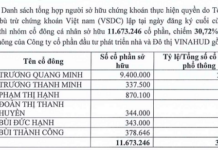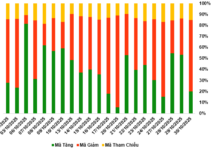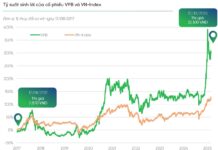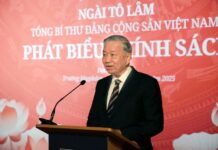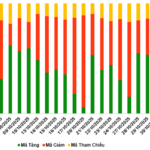Speaking at the Discussion Forum on “Sustainable Development of the Electricity Industry – The Issues at Stake,” held on the morning of September 10, Mr. Vu shared that EVN has some reasonable and legitimate expenses that have not been fully accounted for in the current retail electricity price.
Specifically, in 2022-2023, the geo-political conflict between Russia and Ukraine caused significant turmoil in the world’s primary energy market, with abnormal price hikes. Coal prices in 2022 surged by 163% compared to 2021, and in April 2022 alone, they skyrocketed by 411%, from 138 USD/ton to 705 USD/ton. The gas segment also witnessed an increase, although less steep, at 27.4% compared to 2021. In 2023, the fuel price level improved but remained significantly higher than the 2021 average.
According to the Deputy Director of the Electricity Bureau, Vietnam has only partially achieved self-sufficiency in coal for power generation, with the proportion of imported coal for thermal power plants rising to about 40-50%. “This has led to a substantial increase in EVN’s electricity procurement costs from various sources, especially those utilizing fossil fuels, including coal, gas, and oil,” Mr. Vu remarked.
Regarding the mix of power sources, approximately 30% of the output comes from hydropower, while solar and wind power contribute about 12%. “Although solar and wind power have a total installed capacity of 27-28% of the entire electricity system, their output only accounts for 11-12% due to limited operating hours. Solar power is generated during the day, while wind power depends on the season, with higher output during windy periods. Input fuel costs significantly impact the cost structure of electricity production,” he analyzed.
Moreover, concerning electricity pricing regulations, EVN’s reasonable and legitimate input costs are considered in determining the average retail electricity price for adjustments. However, in 2022, there were no price increases due to the economy’s need for recovery time after the COVID-19 pandemic. In 2023, there were two minor adjustments, but they were insufficient to cover the rising costs. By the end of 2023, EVN faced a significant cost deficit.
“At the end of 2023, EVN faced a deficit in costs, commonly referred to as accumulated losses, amounting to approximately 50,000 billion VND. This excludes the 21,800 billion VND difference in exchange rates that EVN has to pay to power generation units under power purchase agreements. This is due to the fluctuation in exchange rates between the Vietnamese Dong (VND) and foreign currencies that power generation units have to borrow from foreign credit institutions to invest in power sources, which EVN is responsible for settling under the power purchase agreements.”
“This situation creates a gap between EVN’s revenue and total costs, constituting the price of electricity. Sooner or later, we must allow the enterprise to account for accurate and sufficient calculations in the electricity price because EVN cannot bear these burdens indefinitely.”
Mr. Vu’s statement resonated with Dr. Nguyen Si Dung, former Vice Chairman of the National Assembly Office and moderator of the forum. “Using the term ‘loss’ might convey a misunderstanding. Here, we are dealing with unaccounted input costs rather than management issues. In my opinion, deficits arising from poor management or market risks should be labeled as losses. However, in this case, the shortfall results from policies aimed at more significant goals. Indeed, the government’s decision to refrain from raising electricity prices during the economic recovery phase was prudent. Increasing prices at that time would have hampered the economy’s revival. Nonetheless, it is evident that EVN’s input costs have not been adequately reflected in the pricing.”
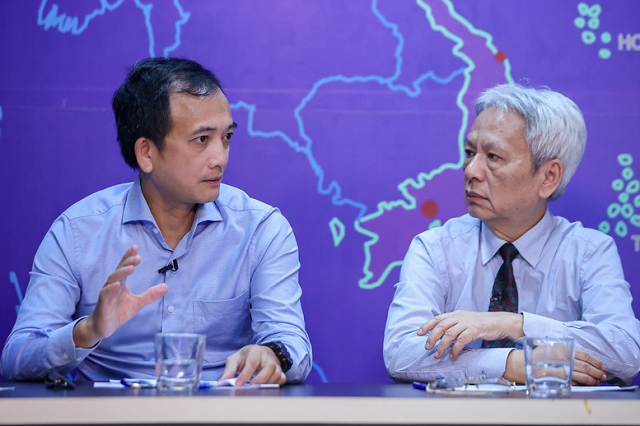 Mr. Trinh Quoc Vu, Deputy Director of the Electricity Bureau (left) and Dr. Nguyen Si Dung. Photo: VGP/Nhat Bac
|
EVN Requires a Healthy Financial Standing
According to Mr. Vu, the 2024 Electricity Law clearly stipulates that the retail electricity price must promptly reflect and adjust to the actual changes in input parameters, covering reasonable and legitimate costs and profits to maintain and develop the business capital of enterprises, aligning with socio-economic conditions and the pace of market competition.
Additionally, Law No. 68 on State Capital Management in Enterprises mandates that enterprises are responsible for preserving and developing capital. As EVN is a state-owned enterprise, with 100% capital owned by the State, it has the responsibility to safeguard and expand the State’s capital within the enterprise,” he asserted.
Notably, the recently issued Resolution 70 of the Politburo emphasizes granting greater autonomy, self-decision, and accountability to enterprises. It also involves reviewing and supplementing specific mechanisms and policies to facilitate and ensure capital for state-owned corporations and enterprises to develop and exploit large-scale, critical, and urgent energy projects. Furthermore, it aims to put an end to the situation where state-owned enterprises delay payments to private enterprises according to signed contracts or agreements.
Mr. Vu emphasized that EVN faces a significant task as the government has entrusted it with investing in critical power sources, such as the Ninh Thuan 1 nuclear power plant and the large-scale Bac Ai Pumped Storage Power Plant, which plays a crucial role in balancing power sources, loads, and wind and thermal power in Quang Trach. Therefore, EVN “urgently needs a healthy financial position to access and borrow capital, not only from domestic credit institutions but also from international sources,” he added.
“We believe that the present is the opportune time to amend and supplement Decree No. 72 to enable EVN to promptly account for power generation costs, ensuring accuracy and sufficiency in electricity pricing, in line with prevailing conditions.”
Support Citizens to Embrace Apps and Smart Meters for Enhanced Monitoring
“Industry leaders from various power corporations and the Vietnam Electricity Group (EVN) have expressed their support for residents taking charge of their electricity bills. They encourage individuals to install their own meters and utilize apps to actively monitor and manage their electricity consumption and costs.”
Unraveling EVN’s Colossal Loss: A Request for Transparency on the $44 Billion Deficit Impacting Electricity Rates
“The feedback from various ministries and associations on Decree 72/2025, crafted by the Ministry of Industry and Trade, proposes supplementary regulations regarding costs not factored into electricity prices. This feedback is a crucial step in shaping the decree and ensuring a comprehensive approach to electricity pricing.”
The Art of Electrifying Mobility: Unveiling the Ministry of Industry and Trade’s Proposed Electricity Retail Pricing for EV Charging Stations
In the second draft of the Circular on Regulations on Electricity Prices, the Ministry of Industry and Trade proposes two retail electricity price schemes for electric vehicle charging purposes.















